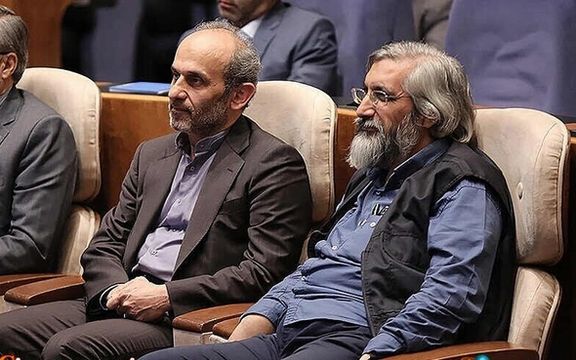Related Articles
US President Donald Trump's optimistic pronouncements regarding negotiations with Iran are primarily an effort to maintain Tehran's engagement in the talks, according to Shahram Kholdi, a professor of international relations.
Speaking to Iran International, Kholdi characterized Trump's optimism as a strategy to prevent any disruption to the process.
"Trump is trying to paint a silver lining around this very gray and ambiguous cloud of negotiations, in the hope that there might be a light at the end of the tunnel and the Islamic Republic agrees to stop enrichment," he said.
Kholdi said that Trump's expressions of confidence are largely intended to keep the Iranian delegation at the negotiating table. "Trump's optimism is mostly to keep the other side at the negotiating table."
The type of fire and smoke confirms that the explosive material was a derivative of sodium, and that a container is by no means a suitable vessel for storing sodium perchlorate, as the heat inside a container cannot be controlled, Farzin Nadimi, a senior defense and security analyst at the Washington Institute, told Iran International.
He said it did not appear that the containers were refrigerated, and the rise in temperature could have been one of the factors triggering the reaction and fire.
“If someone wanted to cause such a reaction leading to a fire, it would be very easy to set off an explosion in such a shipment. It did not seem that there were any serious security measures in place beyond surveillance cameras," Nadimi said regarding the possibility of an act of sabotage.
According to the analyst, either a person or an aerial device could have been responsible.
Nadimi added: “In the video, we did not see anything hitting the container from the sky, but on the ground, a very small and simple explosive device could have triggered the initial fire.”
Resolving the wide-ranging disputes between the United States and Iran will require days of intensive negotiations, political analyst and journalist Omid Memarian told Iran International on Sunday.
Memarian said Iran seeks the full removal of US oil and banking sanctions, but Washington has conditioned any lifting of sanctions on Tehran’s cooperation with the International Atomic Energy Agency (IAEA) — a demand the Islamic Republic has so far resisted.
"Verification and access by the IAEA to Iran’s nuclear activities remain major points of contention," Memariansaid, adding that while US officials are pressing for more comprehensive inspections, Iranian authorities continue to impose restrictions on the agency's monitoring efforts.
Iran’s state broadcaster, Islamic Republic of Iran Broadcasting (IRIB), is facing accusations of undermining the government’s diplomatic efforts with the United States, according to an analysis by KhabarOnline published on Sunday.
As indirect negotiations between Tehran and Washington continue under the authorization of Supreme Leader Ali Khamenei, KhabarOnline said IRIB and its reporters have increasingly aired false claims and anti-diplomacy narratives, challenging the official diplomatic line pursued by President Masoud Pezeshkian’s administration.
The analysis argues that since the election of the current government, the broadcaster has become a platform for opponents, using its platform to act against government decisions. This includes allegedly hosting critics of the US talks and disseminating unsubstantiated details of the discussions.
The analysis specifically mentions a state TV expert who reportedly drew a parallel between the Iran-US talks and the Northern Ireland peace process, suggesting the negotiations could lead to social divisions and even civil conflict in Iran.
KhabarOnline attributed the opposition within IRIB to figures close to Iran’s so-called hardline "shadow government," identifying Peyman Jebelli, the head of IRIB, and Vahid Jalili, brother of senior conservative politician Saeed Jalili, as key figures shaping the network’s editorial stance against the government.

The color of the smoke from the first explosion at Rajaei port in Bandar Abbas suggests the presence of a large amount of sodium, defense and security analyst Farzin Nadimi told Iran International.
"The color of the smoke from the first explosion is completely yellow, which indicates the presence of a large amount of sodium in the blast," Nadimi said.
"Sodium is the main material used to produce sodium perchlorate — the same chemical that was unloaded at Bandar Abbas in February and March this year. This chemical, imported from China, is combined with ammonium chloride to produce ammonium perchlorate, which is used in the production of solid missile fuel," he added.
